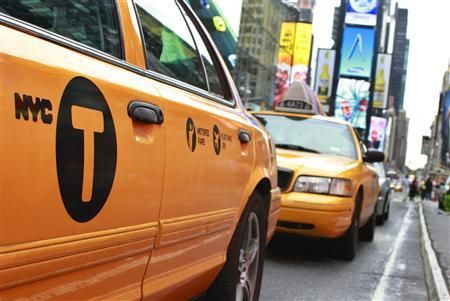Uber Technologies Shuts Down Taxi Transportation Service In New York City
Drivers say startup is asking them to return their Uber-related devices.

Uber Technologies, the privately-held San Francisco-based smartphone app developer that helps users hail taxis and reserve car services, has reportedly shut down its operation in New York City just months after planning a bold entrance into the well-established marketplace.
The news Tuesday came from a report by the tech website The Verge, which cited taxi drivers claiming that the company had begun to ask for its devices back despite public statements from CEO Travis Kalanick himself denying any change of plans.
“Even if Uber is still officially operating taxis in New York, the service is effectively defunct,” the site reports. “The Verge's repeated attempts to hail a cab over the last week resulted in the message, 'We're sorry, no TAXIs are available right now.' Taxis are still being advertised in the app, even though no taxi drivers seemed to be using it; however, on Uber's website, taxis aren't listed as an option in New York.”
Uber first launched its taxi service in New York in September, a move that was generally taken as a brash proclamation against the city’s all-powerful Taxi and Limousine Commission. Like many tech startups, Uber promised to aggressively disrupt the existing marketplace, and hoped that by managing to attract enough consumer interest, it could bypass any red tape that city officials or the transportation commission could throw at them.
Uber’s app lets users hail a cab simply by tapping a touch screen rather than dealing with the frustration of waiting outside and searching for a physical car. Furthermore, users would take the entire trip without ever having to use cash or their credit card in the cab itself, instead replying on the app’s own internal mobile payment system. While these are fees tend to be more expensive than standard taxi cab tips, Uber hoped that by expanding into lower cost rides the benefit of spontaneity and the convenience of the app itself would win out in the end.
Whether or not it could have appealed to consumers, Uber’s app never had the chance to win them over, for soon after launching, the Taxi and Limousine Commission stamped down on the service, saying it could not fully launch until February at the earliest.
TLC Chairman David Yassky, a former Democratic member of the City Council appointed by Mayor Michael Bloomberg, said at the time, "The TLC is eager to pave the way for taxi drivers to take advantage of the most up-to-date technology, including smartphone apps that may help passengers locate available taxicabs more quickly."
The TLC already disputed Uber’s alleged ability to pre-calculate fares, a practice that runs against the grains of New York’s main transportation services. But the regulation that finally caught Uber in its last hurdle was the fact that taxi drivers in New York are strongly forbidden from using any sort of mobile handheld device while driving, a requirement that nixed Uber’s core product from the equation.
Throughout Uber’s network including California itself, the company has faced numerous problems with public transportation regular and auto insurance. While its service has proven popular in San Francisco and London, Uber is also being sued in Chicago, where Taxi companies are taking issue with the company claiming half of the drivers’ tips.
© Copyright IBTimes 2024. All rights reserved.






















